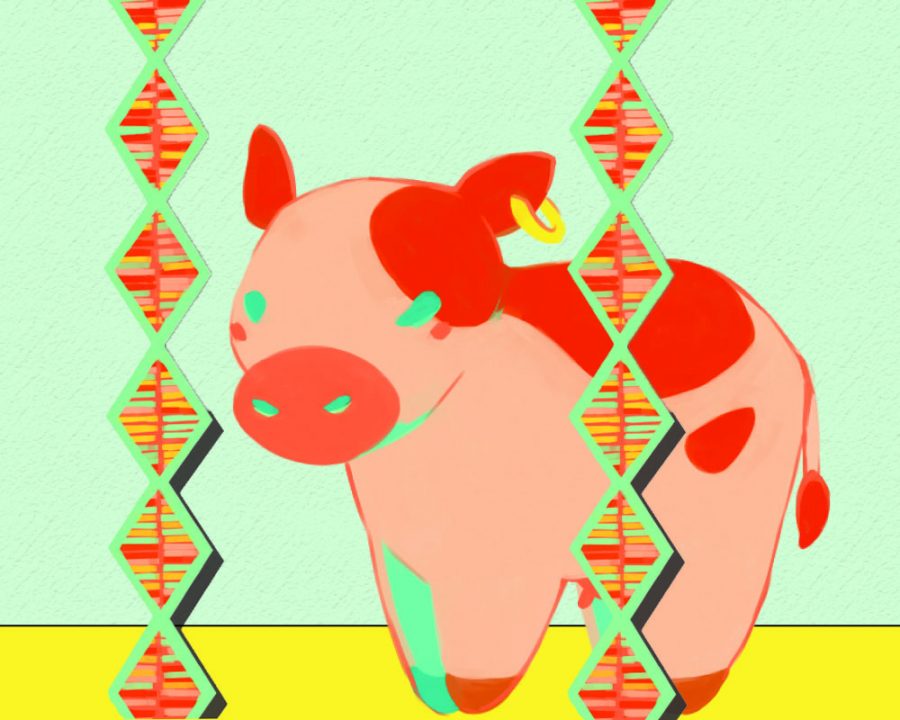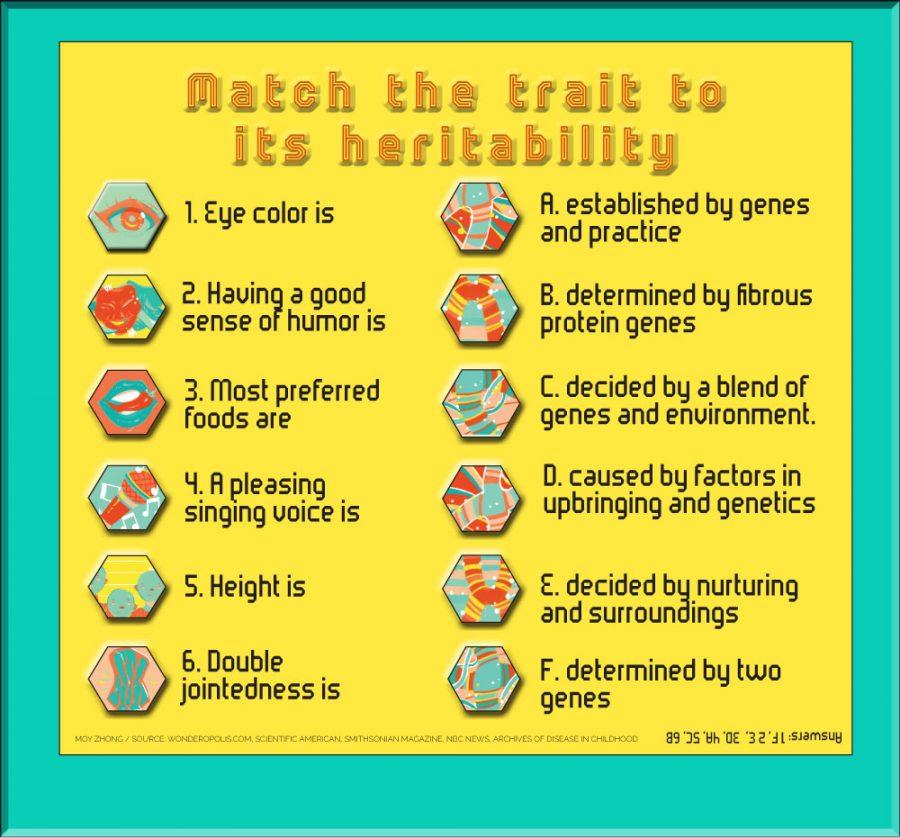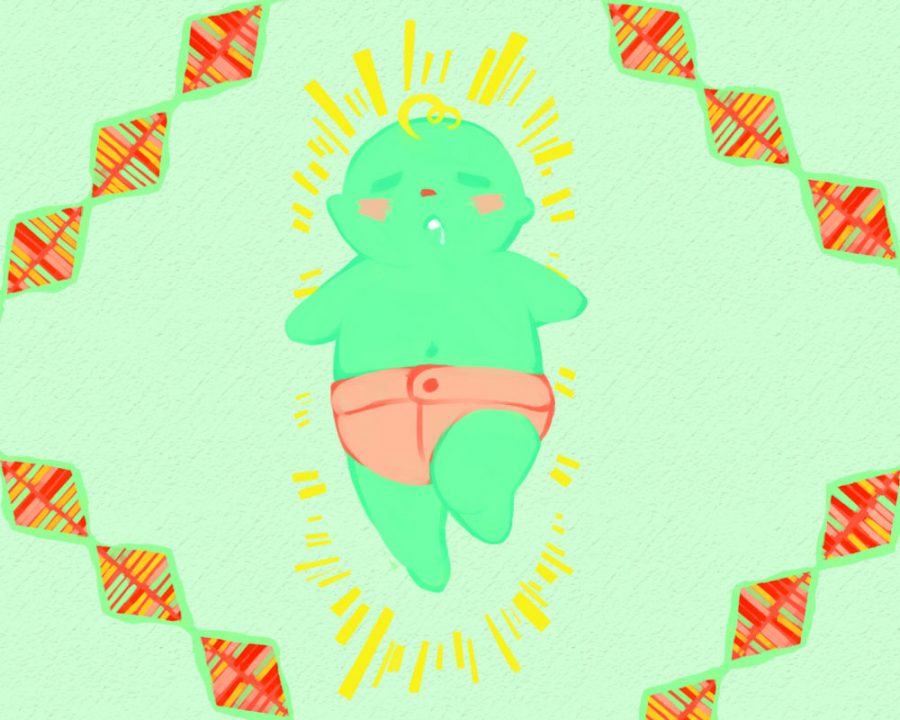Art by Moy Zhong
After 30 years of intensive research and experimentation, modern genetic technology is in the position to drastically change organisms, large and small, through genetic engineering. The altering of genes, which involves splicing, insertion and deletion, makes microscopic changes to the sequencing of deoxyribonucleic acid (DNA). The altering of DNA is not visible to the eye, or even through most microscopes, but can completely change the makeup and physical attributes of the grown organism.
Dr. James West, an associate professor of medicine at Vanderbilt University and 1987 RBHS alumni, studies genetic engineering and has years of research knowledge. Currently, the National Health Institute funds Dr. West to cure pulmonary arterial hypertension by gene editing bone marrow instead of making patient wait on marrow that may or may not be a match. Dr. West is also working on genetically improving cattle for a growing population and finding solutions to withering syndrome, a disease that affects the west coast ecosystem and nearly driven some snails and coastal animals to extinction.
“We’re curing disease, improving animal welfare and reducing the impact of humanity on the planet,” Dr. West said. “Genetic engineering is going to make us, and our animals, live longer, have higher productivity and a lower environmental impact.”
Cloning multiplies controversy, not just animals
Gene multiplication, commonly known as cloning, is another form of genetic engineering. Cloning has been a focus for many genetic engineers, as they theorize it could cure diseases, prevent extinction and change the idea of life, but also challenges morality and is not permitted in many countries.
Jaehyung Rhee, a 2016 RBHS alumni, lived in South Korea where she interned for Soaam, a dog cloning facility. In addition to cloning dogs, the facility is also working on pigs, cows, cats and extinct creatures. Rhee believes her work at the lab was ultimately positive because of the potential for biomedical advancements.
“All technology comes with positive and negative sides,” Rhee said. “The ethical procedure that goes behind a lot of science I don’t completely agree with, but I know that that’s what it takes for advancement.”
Law and ethics limit the reach of engineering
Most governments place strict guidelines on cloning, so Rhee believes human cloning will never be explored fully. For the future, researchers will continue to explore the genome and one day, it could revolutionize the medical field and solve many of the world’s problems.
“There are biomedical labs that are trying to clone tissues or trying to genetically clone organs and I think that’s totally viable as research goes on, not even with just cloning but with cancer genes,” Rhee, who is pursuing a future career in Biomedical Engineering, said. “They will definitely advance medicine. With regulations and adequate supervision from governments, I definitely think [genetic engineering] will make society more efficient and intelligent.”
Genetically modified foods increase yield, but also allergies
GMOs are vital to the food processing industry in the United States (U.S.) According to an article from Center for Food Safety, 92 percent of corn, 94 percent of cotton and 75 percent of processed food in the U.S. are genetically modified products. Many of the food labels on GMOs may not be entirely correct since most GMOs aren’t labeled as “modified,” which causes problems when regulators want to know what exactly is in the food.
When the modification is added, it can also change the genetic makeup of the food enough to cause an allergic reaction, even if the person wasn’t allergic before. While genetic modification may potentially add allergenic material to a plant, there are some GMOs that solve issues with allergies, such as peanuts that have their reactive allergens taken out. Senior Jake Walters is highly allergic to peanuts and is hopeful for the future of genetic engineering.
“I wouldn’t be a pioneer of any studies, but if it was proven, I would trust it,” Walters said. “[I hope] they can apply this to all allergy cases. I’m excited to hear how it turns out.”
Outside of the lab, GMOs and genetic engineering are useful to many other occupations, as well. Many farmers and people who work in agriculture work with modified foods every day. Junior Henry Wilson’s family owns a cattle farm, where he was raised to appreciate the efficiency of GMOs.
“GMOs are an extremely efficient way for sustaining the world’s food supply if contained by adapting to environmental changes and land constraints,” Wilson said.
On a macro level, Wilson sees GMOs as a global benefit. For third-world countries, GMOs may be a matter of life or death. According to an article from the National Center of Biotechnology Information, insect damage is responsible for 15 percent of the world’s pre-harvest food losses, and that’s almost entirely in developing countries. The United States. percentage of insect damage is much lower due to the modern technology available. In addition to saving the crops, GMOs can also yield more crops and produce larger, more nutritious foods.
“GMOs can allow for a less expensive food supply,” said Wilson, who sees hunger as a major global problem. “With improvement they can also help the almost certain effects of climate change by creating a stronger crop.”
GMO benefits stop at the barn’s door
Many people support genetic modification for crops, as it holds agricultural and nutritional benefits to the entire globe. Junior Quinn Cunningham agrees with the importance of GMOs in crops, but is opposed to genetically modifying farm animals for agriculture. Cunningham predicts lab-grown meat made from stem cells of animals will be a viable option for carnivores in the next decade. Lab-grown meat could eliminate the cruelty of animal farms and save the life of an animal. With genetically modified animals, however, Cunningham is afraid that lab-grown meat will not compete with modified animals and will lead to more animal cruelty.
“[Factory farms] are the darkest realms of hell for all their inhabitants. I support any opportunity to end the current system of mass genocide and am opposed to any technology which promises to make conventional meat cheaper for the average consumer,” Cunningham said. “Cheapening the price of conventional meat is an inevitable consequence of genetically modifying animals.”
Genetic engineering offers environmental solutions
Genetic engineering may be the solution to the problems that other human technology caused, including the increase in greenhouse gases. Dr. West described the free molecules of carbon in the atmosphere as a gold mine for genetic engineers.
“By the middle of the century, people won’t be complaining that we’re putting too much carbon into the air. They’ll be complaining we’re taking too much out,” Dr. West said. “Both I and several people I know are leveraging the increased atmospheric and ocean carbon to make land and ocean plants and animals more productive.”
Dr. West and many other engineers actively work to see how their research can impact the world by using what’s already in the environment to make change.
“The biotech revolution is going to make the computing revolution look petty,” Dr. West said. “It is the solution to most of humanity and the planet’s most vexing problems.”
What do you think genetic engineering will accomplish in the future? Leave a comment below.
















































































